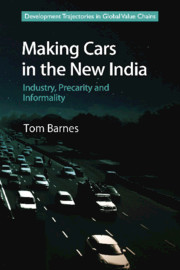Book contents
- Frontmatter
- Dedication
- Contents
- Tables, Figures and Maps
- Acknowledgments
- Abbreviations
- 1 The Limits of Industrialisation
- 2 The Auto Industry in India Today
- 3 Auto Manufacturing and the Evolution of Industrial Policy
- 4 The Transformation of Labour Relations
- 5 Auto Workers in India's National Capital Region
- 6 Work and Life at the Bottom of the Auto Supply Chain
- 7 Driving Down the ‘Low Road’?
- Appendix
- Bibliography
- Index
7 - Driving Down the ‘Low Road’?
Published online by Cambridge University Press: 23 October 2018
- Frontmatter
- Dedication
- Contents
- Tables, Figures and Maps
- Acknowledgments
- Abbreviations
- 1 The Limits of Industrialisation
- 2 The Auto Industry in India Today
- 3 Auto Manufacturing and the Evolution of Industrial Policy
- 4 The Transformation of Labour Relations
- 5 Auto Workers in India's National Capital Region
- 6 Work and Life at the Bottom of the Auto Supply Chain
- 7 Driving Down the ‘Low Road’?
- Appendix
- Bibliography
- Index
Summary
Leading industrialists in auto manufacturing have made recent, widely-publicised efforts to support Narendra Modi's ‘Make in India’ initiative, which aims to attract new Foreign Direct Investment (FDI) in Indian manufacturing as the basis for income growth, employment creation and rising prosperity (GoI, 2016; 2016a). For example, India's second Automotive Mission Plan (AMP-2), co-produced by the Society of Indian Automobile Manufacturers (SIAM), aims ‘to propel the Indian automotive industry to be the engine of the “Make in India” program’ (SIAM/GoI, 2015: 3).
CEOs of several global auto manufacturers have visited India during Modi's premiership to reiterate their commitment to Indian manufacturing. High profile examples include Suzuki, Toyota, Hyundai, Renault-Nissan and Ford. Maruti Suzuki India Limited (MSIL) chairman, R.C. Bhargava, has argued that ‘nobody wants to miss the opportunity and the size. They don't see the kind of potential growth in any other market like in India’ (cited in Thakkar, 2017a).
The scale and intensity of conflict in India's automotive industry presents a radically different side to this elite-driven narrative. Conflict in Indian auto manufacturing has taken many forms, manifesting at a workplace or enterprise-level, at an industry level through solidarity strike action and street protests, and at the level of social and political conflict. Various forms of industrial conflict, including strikes, employer lockouts, factory occupations and hunger strikes, have increased in frequency since the 1990s.
During this period, a gradual process of economic liberalisation has culminated in the opening up of all domestic auto manufacturing to FDI, and the removal of residual restrictions on the investment activities of industrialists – domestic and foreign. Since the mid-1990s, most of the world's leading global automotive lead firms – known as Original Equipment Manufacturers (OEMs) – and their strategic partners and key components suppliers have established operations in different regions of India.
This process of liberalisation, investment, relocation and industrialisation has profoundly shaped the development of Indian regions. It has given rise to new industrial zones and reshaped established ones. Auto manufacturing transplants have resulted in a rise in infrastructure development through road and rail-building, commercial and residential construction and construction of shopping malls to cater for a growing minority of middle-to-high income residents
- Type
- Chapter
- Information
- Making Cars in the New IndiaIndustry, Precarity and Informality, pp. 197 - 228Publisher: Cambridge University PressPrint publication year: 2018

